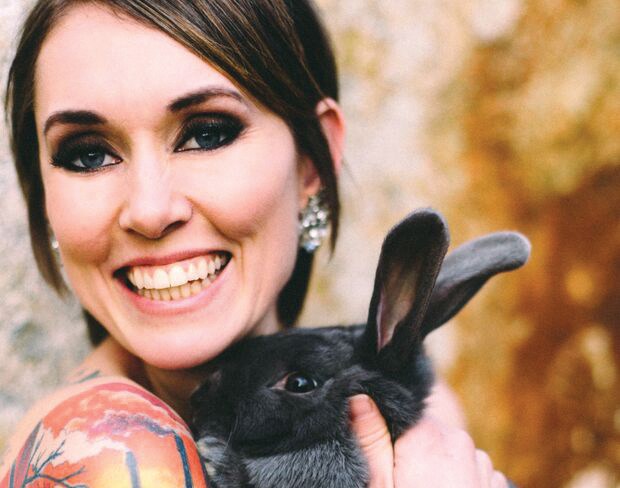Michelle Nelson’s apartment in east Vancouver played host to an unusual feature in the sitting room: a large rabbit hutch.
But these fluffy bunnies were not pets. Nelson gave them no names. She didn’t pet them and tried to encourage their natural behaviour. Nelson knew eventually, they would end up on the dinner table.
“It was an experiment for me,” she says. “I care so much about animal welfare that I hadn’t eaten meat for a decade.”
Nelson dreamed of owning a hobby farm, a place where she could grow her own food and raise her own farm animals. One day she thought, ‘Why wait?’ Nelson wanted to explore what she could do in a small, urban space.
“I don’t mind being the ‘crazy person,’” she says. “A lot of times when I start explaining to people what I am doing, they relate to the concept.”
With a PhD in conservation biology and sustainable agriculture, Nelson started a process of trial and error. She looked at foraging in urban areas, growing aquatic vegetables in buckets and even raising and using insects for cooking. She documented her successes and compiled them into The Urban Homesteading Cookbook.
“I have a recipe in the book that uses insect flour to make dark and stormy cupcakes,” Nelson says. “You would never tell there is insect flour in them. It has a bit of a nutty taste.”
This weekend at �鶹�����Public Library, Nelson will share her stories with those interested. Even though some �鶹�����residents may live in dwellings with more space than a downtown Vancouver apartment, the methods of urban growing and microlivestock will be useful to them, Nelson says.
Within a small lot, one can host everything from aquaponics – creating a symbiotic environment that feeds plant life while supporting aquatic life – to beekeeping. For people living in spaces too small for chickens but still wishing for poultry, Nelson recommends keeping quail; the midsize birds produce eggs, the females don’t make noise and their pens are easy to clean, she notes.
“You can potentially keep quail on an apartment patio,” Nelson says.
While it may all sound a bit wacky to some, the reasoning behind microlivestock comes from a place of wanting to eat ethically, she says. Nelson seeks to create meals that are more sustainable and healthy, with meat from humanely treated animals. Even as a vegetarian, Nelson says she couldn’t escape unsustainable practices, noting soy beans often come from crops on deforested land.
“I definitely think there is a food shift going on,” she says. “People are more interested in things like farmers’ markets.”
In her cookbook , Nelson shares methods she has learned about earth-wise consumption from her grandma’s homestead on the Sunshine Coast and provides ideas that stem from her educational background.
“There are lots of benefits to eating home-cooked meals, from the satisfaction of preparing it to cost saving and being able to make sustainable choices.”
Having yearned for a small patch of land where she can keep goats, Nelson now lives on Bowen Island. Her friends are always excited to come over for dinner, knowing that whatever will be on the table is likely going to be something tasty and unexpected.
“They totally love it. And we always give food as gifts,” she says, adding they’re highly anticipated presents.
Nelson’s presentation at �鶹�����Public Library will begin at 6:30 p.m. on Tuesday (Oct. 6).



